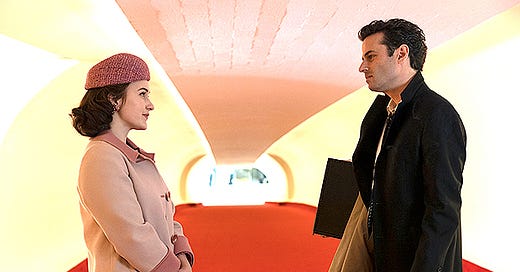I first heard of Lenny Bruce in my early teens in probably 1969-70 from some hipper kids. Wannabe-hip sponge that I was, I instantly soaked up what I now know had already become a counterculture story of the sick-society police oppression of truth, Lenny Bruce a martyr to the cause of freedom, dead in 1966 of a drug overdose to which he’d been driven by the Man, a fallen early sage of what in 1970 was supposed to be the oncoming Revolution. I spoke of Lenny, I mean, with some confidence—and called him “Lenny”—before I knew anything about him.
I didn’t listen to his comedy. It wasn’t that easy to come by, for one thing. Youngsters today can instantly get their hands on anything they hear about. We couldn’t, putting it mildly. By ’70, the early-’60’s comedy LP’s were old. If they were still stocked at Korvettes, the cheap department store on Fulton Street in Brooklyn where I bought my Jefferson Airplane, I never noticed them.
I think some of my friends and their liberal parents did have some old Lenny Bruce albums—I caught knowing references to “Father Flotsky” and other trademark bits—but what little I heard of him I didn’t relate to (I pretended I did, because of Saint Lenny). “Underground” comedy of that moment, really meaning college-radio comedy, was stoner/psychedelic surreal: Firesign Theater, which I gobbled up, and, yes, Cheech and Chong, which gave me a chuckle. And new, cool comedians were coming along, like Robert Klein. To the extent that I heard any Lenny Bruce, it seemed pretty dated and beatniky—all that fidgety “dig” as punctuation—and really just not that funny, kind of rambling and dull.
At some point, maybe ’72 or ’73, the alternative NYC radio station WBAI played a Lenny Bruce concert, maybe the famous Carnegie Hall show. I tried to like it, but again I found the bits, the various character voices, etc., remote, tedious, with no jokes, just occasional chuckles from social and cultural satire whose points I thought I’d already grokked.
I still mainly feel that way. The “jazz comedy” improv approach seems to me arty but not artful. The guy had zero timing. And that’s leaving out Lenny’s endgame period, where the act declined into an obsession with his own victimhood (getting harassed and arrested and tried for saying what you want to say might well have that effect on anyone). His stuff underlies a lot of stuff I liked then, as well as a lot of stuff I like now. There’s probably no Robert Klein or Larry David or George Carlin or Joan Rivers or Richard Pryor without Lenny Bruce. But it’s a weird fact that the artists you admire often have artistic forebears you can’t see much in.
By the time I was listening to the WBAI presentation, though, I was also reading or had read How to Talk Dirty and Influence People, Bruce’s autobiography, incorporating some of his bits, published a year before his death. The book had a bigger impact on me than anything I heard then or hear now in Bruce’s comedy. It also makes clear why the comedy didn’t reach me, and in doing that, the book did reach me, opened up a world that I’ve never stopped finding fascinating and which seemed to be ending around the time I first fully noticed it in Lenny’s book.
The reason Lenny’s material seemed as if it came from an outmoded world is that it did. The book makes clear that Lenny Bruce was no counterculture guy. He was a subculture guy who made it, for a minute, into the mainstream, where he faced some nasty forces he couldn’t handle. It’s the subculture that still compels me, a b&w crime-scene-flashbulb universe of strip joints and clip joints, Benzedrine and Brylcream, pools halls, poker games, constant efforts at getting laid, with a hard-won, well-earned cynicism about authority: the late-in-WWII-draftee attitude snottily at odds with the VFW Hall (though Bruce himself enlisted in the Navy in ’42 and served in the Merchant Marine in the Korean War).



